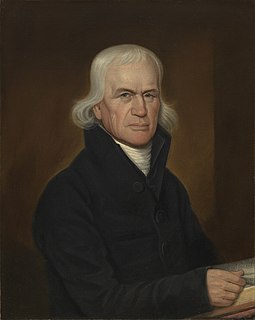A Quote by Francis Asbury
Oh what people of God we ought to be; and grace can make us so!
Related Quotes
It is grace at the beginning, and grace at the end. So that when you and I come to lie upon our death beds, the one thing that should comfort and help and strengthen us there is the thing that helped us in the beginning. Not what we have been, not what we have done, but the Grace of God in Jesus Christ our Lord. The Christian life starts with grace, it must continue with grace, it ends with grace. Grace wondrous grace. By the grace of God I am what I am. Yet not I, but the Grace of God which was with me.
This is the amazing story of God’s grace. God saves us by His grace and transforms us more and more into the likeness of His Son by His grace. In all our trials and afflictions, He sustains and strengthens us by His grace. He calls us by grace to perform our own unique function within the Body of Christ. Then, again by grace, He gives to each of us the spiritual gifts necessary to fulfill our calling. As we serve Him, He makes that service acceptable to Himself by grace, and then rewards us a hundredfold by grace.
We live in a church culture that has a dangerous tendency to disconnect the grace of God from the glory of God. Our hearts resonate with the idea of enjoying God's grace. We bask in sermons, conferences, and books that exalt a grace centering on us. And while the wonder of grace is worthy of our attention, if that grace is disconnected from its purpose, the sad result is a self-centered Christianity that bypasses the heart of God.
The love of God is not taught. No one has taught us to enjoy the light or to be attached to life more than anything else. And no one has taught us to love the two people who brought us into the world and educated us. Which is all the more reason to believe that we did not learn to love God as a result of outside instruction. In the very nature of every human being has been sown the seed of the ability to love. You and I ought to welcome this seed, cultivate it carefully, nourish it attentively and foster its growth by going to the school of God's commandments with help of His grace.
Today is [the feast of] Santa Rita, Patron Saint of impossible things - but this seems impossible: let us ask of her this grace, this grace that all, all, all people would do good and that we would encounter one another in this work, which is a work of creation, like the creation of the Father. A work of the family, because we are all children of God, all of us, all of us! And God loves us, all of us! May Santa Rita grant us this grace, which seems almost impossible. Amen.
Only when we see that the way of God's law is absolutely inflexible will we see that God's grace is absolutely indispensable. A high view of the law reminds us that God accepts us on the basis of Christ's perfection, not our progress. Grace, properly understood, is the movement of a holy God toward an unholy people. He doesn't cheapen the law or ease its requirements. He fulfills them in his Son, who then gives his righteousness to us. That's the gospel. Pure and simple.
[Grace] is given not to make us something other than ourselves but to make us radically ourselves. Grace is given not to implant in us a foreign wisdom but to make us alive to the wisdom that was born with us in our mother?s womb. Grace is given not to lead us into another identity but to reconnect us to the beauty of our deepest identity. And grace is given not that we might find some exterior source of strength but that we might be established again in the deep inner security of our being and in learning to lose ourselves in love for one another to truly find ourselves.
If a person has grasped the meaning of God's grace in his heart, he will do justice. If he doesn't live justly, then he may say with his lips that he is grateful for God's grace, but in his heart he is far from him. If he doesn't care about the poor, it reveals that at best he doesn't understand the grace he has experienced, and at worst he has not really encountered the saving mercy of God. Grace should make you just.


































